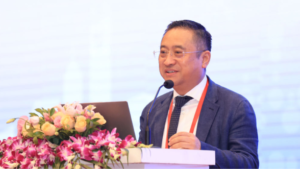![[KanKan News]Asian organ transplantation symposium 2024 held in Shanghai 1](https://www.transplantation.com.cn/wp-content/uploads/2024/11/image-20.png)
2024-11-23 10:23:46 Read the news Knews roundup
Human organ transplantation is a key medical technology to save critical patients, which is of great significance to the development of national medicine and social progress. Since the start of organ donation pilot in 2010, our country has achieved remarkable results in terms of system design, social mobilization and standard procedures, and established a sound working system, both the quantity and quality of organ donation and transplantation have been improved. However, according to the China Organ Transplantation Development Report (2021) , the organ donation rate per million population in our country is 3.73, which still lags behind the international advanced level. Therefore, it is necessary to further improve the mechanism and system, Innovate Medical Technology, and promote the balanced distribution of high-quality medical resources.
As the first approved comprehensive National Medical Center Construction Project Unit, Zhongshan Hospital affiliated to Fudan University is one of the few comprehensive hospitals qualified for heart, liver, kidney and pancreas transplantation in our country, in the field of organ transplantation led many technological innovations, completed the first relative kidney transplantation of children with Denys-Drash syndrome in China, the first sequential heart, liver and kidney transplantation in Asia, the first“Combined heart-liver transplantation” in Asia, the world’s first“Relative liver” and“Abandoned liver” double donor liver transplantation, the world’s first“Abandoned liver” liver transplantation combined with ALPPS, etc. . In order to further promote the development of organ transplantation in our country, the Asian organ transplantation symposium (TSS) , an international academic conference officially accredited by the International Transplant Society (TTS) and hosted by hospitals in Zhongshan, opened on November 22.
Chen Zhu, the 13th Vice Chairman of the Standing Committee of the National People’s Congress, was invited to deliver a video speech at the opening ceremony of the Congress, the current chairman of the International Society for Organ Transplantation, John Fung, and the president of the Zhongshan Hospital of Fudan University, Professor Zhou Jian, attended the opening ceremony and delivered speeches. Ke Zhu Tongyu, vice president of the Fudan University Shanghai Medical College and Professor of kidney transplantation at Sun Yat-sen hospital, presided over the opening ceremony.
Zhou Jian, head of Zhongshan’s Hospital, said that while our country had made significant progress in organ transplantation, it still faced a serious shortage of organs. This requires not only further improving the existing organ donation and distribution system to ensure fair, transparent and efficient operation, but also technological innovation. Through the use of advanced medical technologies and methods, such as the world’s first”Abandoned liver” liver transplantation combined with ALPSS surgery performed in Zhongshan Hospital, it can effectively expand the source of donors and improve the success rate of surgery, so as to alleviate the current tension between supply and demand.
However, in addition to the problem of organ source, transplant patients also face the hidden dangers of immunosuppression. They must continue to take immunosuppressants to prevent rejection, but this also weakens their resistance to outside pathogens, making them more susceptible to infection. Unusual”Opportunistic” pathogens can also pose a serious threat, especially in patients with weakened immune systems. Therefore, how to improve the immunity of patients after transplantation and reduce the risk of infection has become another urgent problem.
In response to this situation, professor Zhu Tongyu and his team first proposed at the meeting, “Organ transplantation of serious and special infection of innovative diagnosis and treatment model.”. This model includes the development of new diagnostic systems to accurately diagnose pathogens, the use of phages to treat refractory bacterial infections after transplantation, and the development of BK virus vaccines to prevent viral infections. The aim is to improve patients’ ability to fight common infections and prevent rare but deadly Opportunistic infection. “We hope that in this way, we can not only significantly improve the quality of life of organ transplant recipients, but also further improve their long-term survival rate,” professor Zhu said. This study provides new ideas and methods for optimizing care after organ transplantation in the future, and marks an important step forward in improving transplant safety in our country.
It is reported that since 2018, professor Zhu Tongyu led the team to launch the first clinical trial of phage therapy in our country, and achieved a clinical improvement rate of 78.3% . During this period, the team also published the first phage therapy case report in our country, as well as the world’s first case set and case paper on phage therapy for covid-19 secondary bacterial infection. In 2022, the team initiated the establishment of the Chinese Phage Research Alliance, and issued the expert consensus and group standards for phage therapy and phage preparation quality standards.
During the keynote speech after the opening ceremony, Shiro Takahara, president of Kansai Region Kidney Transplant Medical Center, honorary president of the Congress, Zhang Chongwei, deputy director of China Organ Donation Management Center, Wan Jun, president of Hong Kong Society of Immunology, China, transplantation magazine executive editor Carla C. Li Bozhang, former president of the Organ Transplantation Society of Taiwan, China, hundreds of Seoul National University experts and scholars (40% of them international experts) from major countries and regions around the world, including Sangil Min, professor of surgery at Korean General Hospital, gathered here, the key scientific issues such as scientific research innovation, organ injury and repair, clinical immune tolerance and infection after organ transplantation are discussed in depth.
Looking ahead, organ transplant teams in Zhongshan hospitals will strive to build“New quality productivity”, explore major scientific issues in basic theory, and accelerate the transformation of basic research results into clinical applications, and to develop the world’s leading clinical innovation technology, in order to bring gospel for more organ transplant patients.
| Editor: | Qian Yuhao |
| Editor: | Dong Yihua |


